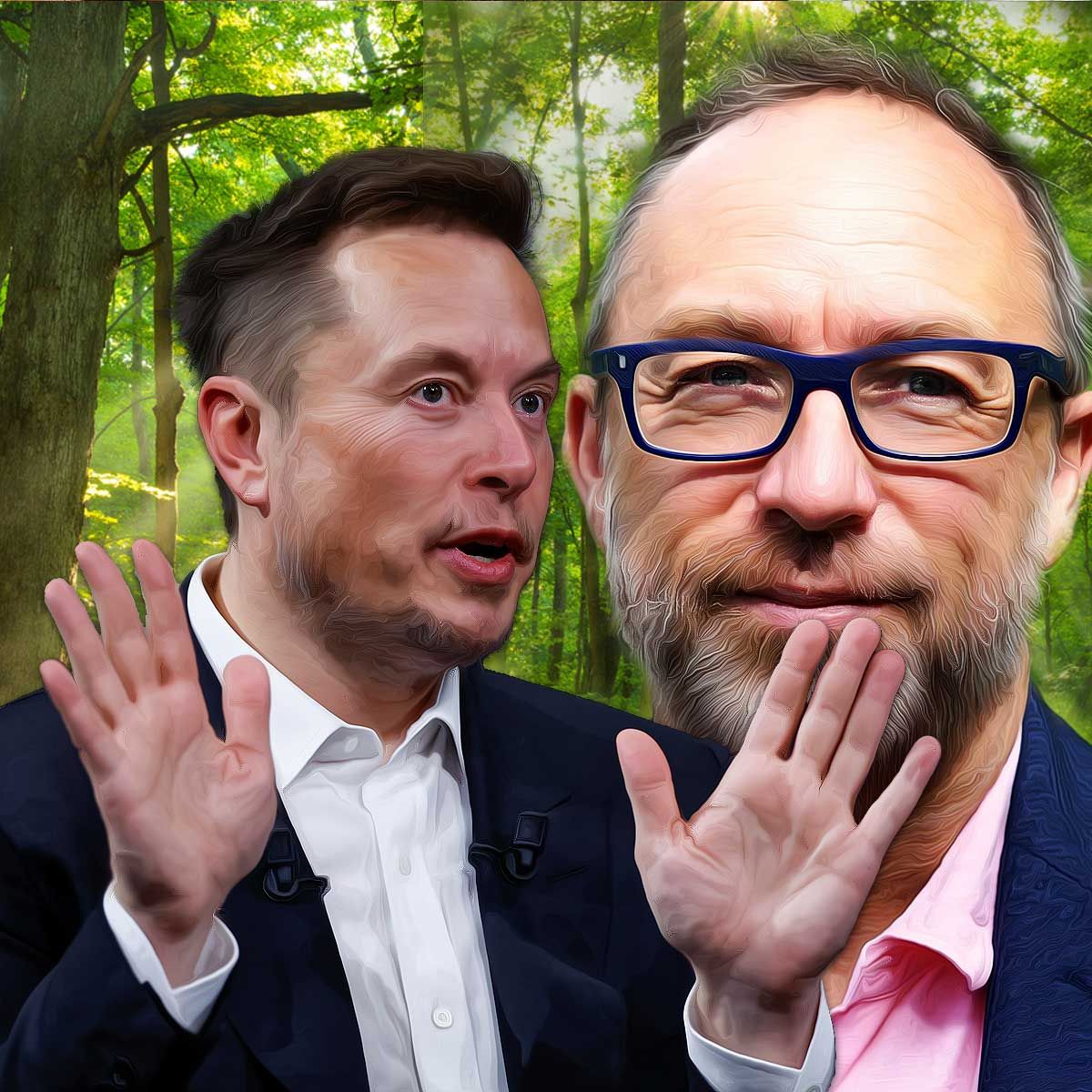MORE COVERAGE
Twitter Coverage
Satyaagrah
Written on
Satyaagrah
Written on
Satyaagrah
Written on
Satyaagrah
Written on
Satyaagrah
Written on
JOIN SATYAAGRAH SOCIAL MEDIA
Elon Musk, with his signature sarcasm, offers a cool billion to rename Wikipedia to 'Dickipedia', meanwhile, this 'non-profit' after incessantly shaking its digital tin cup, sits atop a mountain of cash, wonder where all those 'just £2' donations vanished

Elon Musk's proposal to Wikipedia has caused quite a stir, especially given the platform's evergreen financial struggles. Wikipedia has always maintained a public-facing donation model to run its operations, often popping up appeals that some users find borderline intrusive. Musk's generous offer might seem like a solution to their financial woes on the surface, but the catch is too hilarious (or humiliating, depending on which side of the fence you're on) to ignore.
|
Elon's choice of the name ‘Dickipedia’ is not just a random pick. It's a satirical jab, hinting at the perceived 'dickish' behavior of Wikipedia editors who have been accused of bias and manipulation. This isn't the first time the Tesla and SpaceX CEO has thrown shade at entities he feels are misrepresenting facts. His tiffs with certain media houses and his criticisms of their reporting standards are well-documented.
His acquisition of X (Twitter) has given him a platform where he can voice his opinions without fear of being muted. And it seems he's using it to its full potential, not shying away from calling out those he believes are in the wrong. The offer, while humorous, also underscores Musk's belief in the importance of unbiased information platforms. After all, a billion dollars isn't just pocket change, even for him. If Wikipedia accepts the offer, it would be a testament to their need for funds over their pride in the brand. On the other hand, declining it could be seen as standing up for their integrity, albeit with a lighter wallet. The ball is now in Wikipedia's court. How they respond could set an interesting precedent in the tug of war between money and principles
|
|
Elon Musk's penchant for satire was on full display as he took a cheeky swipe at Wikipedia. His tweet, referencing a banner that boldly claimed "Wikipedia is not for sale", dripped with irony. By offering a staggering billion dollars just for a name change to 'Dickipedia', Musk not only highlighted the platform's frequent financial pleas but also questioned its integrity and accuracy.
Musk's directive to add this billion-dollar proposition to his Wikipedia page is the cherry on top. It's as if he's saying, "Let's see if you can report this without bias." His statement that the renaming is “in the interests of accuracy” is a clear dig, suggesting that the current name might not fully represent the content's authenticity or lack thereof.
It's evident that Musk is not just throwing money for laughs. He's making a pointed commentary on the state of information dissemination and the platforms that host such content. Wikipedia, revered by many as a go-to source for information, is now under the microscope, being called out by one of the world's most influential figures.
|
The question that now looms large is: Will Wikipedia rise to the challenge, stand by its declaration that it's "not for sale", and maintain its dignity? Or will the allure of a billion dollars prove too tempting, pushing them to reconsider their stance and possibly their name? Time will tell, but for now, the internet is abuzz, waiting with bated breath for Wikipedia's move in this high-stakes game of satire and sarcasm.
Elon Musk's jests continued as he set specific terms for his billion-dollar proposition. When Ed Krassenstein, a journalist, cheekily suggested that Wikipedia could simply revert to its original name after pocketing the billion, Musk was quick to retort with his conditions, asserting that the name change would have to stick for "at least 1 year." His remark, “One year minimum. I mean, I’m not a fool lol,” further accentuated his humorous yet pointed take on the entire situation.
Yet, Musk's jesting wasn't limited to just the name change. When presented with a screenshot of a 'Dickipedia' page - a collection of humorous, satirical biographies, Musk's love for satire came to the forefront once again. He promptly expressed his appreciation, exclaiming how much he loved ‘Dickipedia’.
It's noteworthy that the person behind these playful jabs isn't just anyone. Elon Musk, a multifaceted business magnate, has his fingers in several pies. From spearheading the electric vehicle revolution with Tesla to pushing the boundaries of space travel with SpaceX, from pioneering underground transportation solutions with Boring to now being at the helm of the social media giant, X (formerly known as Twitter). His expansive portfolio also includes groundbreaking ventures like Neuralink, OpenAI, and PayPal.
The tug-of-war between Musk's jests and Wikipedia's proclaimed integrity has indeed set the stage for an intriguing watch. With the tech mogul's vast influence and Wikipedia's commitment to unbiased information at stake, one can only wonder what the next move will be in this captivating dance of wit and principle.
|
The next time Wikipedia asks for a donation, ignore it
It's easy to be swayed by Wikipedia's heartfelt banners urging you to donate "just £2." After all, for many, Wikipedia serves as the go-to hub for quick information, a free digital encyclopedia at your fingertips. The banners, which have been prominently displayed across several English-speaking regions, might give you the impression of a struggling organization in dire need of funds. But is that truly the case?
Before you rush to pull out your wallet, it's essential to peel back the layers and take a closer look at the platform. For years, Wikipedia has prided itself on being a free, open-source platform driven by voluntary contributions from individuals worldwide. But there's more to the story. The recurrent fundraising campaigns and the emotional appeals might paint a picture of urgency, but how transparent has Wikipedia been about its financial health, its expenditures, and where your donations truly go?
|
Elon Musk's recent satirical stance and offer, though humorous, sheds light on a broader issue. It prompts users and donors to question the credibility and intentions of platforms that constantly seek financial assistance. While donating to support free information is a noble act, it becomes crucial for users to be informed and discerning. After all, in an era where information is abundant, ensuring its authenticity and the integrity of its source is paramount.
Wikipedia, often lauded as the democratizer of information, has lately been subject to scrutiny, and not just for its content. While its banners paint a picture of a platform gasping for funds, the numbers tell a different story. The San Francisco-based Wikimedia Foundation, the mastermind behind these compelling donation requests, seems to have struck gold with this fundraising strategy.
|
With each passing year, this non-profit has been watching its coffers swell, thanks in large part to these banner ads. As of March, the Foundation boasted a staggering $400 million in cash reserves. Moreover, they initiated an endowment managed by the Tides Foundation, which has already accumulated over $100 million. What's even more eyebrow-raising is the speed with which this endowment grew, surpassing its target in half the expected time. In 2021 alone, these appeals raked in an impressive $162 million, marking a 50% surge from the previous year.
But here's the kicker: the actual operational costs to keep Wikipedia up and running are a mere drop in this vast ocean of funds. For instance, in the fiscal year 2012/13, the budget allocated for delivering all its free content was a meager $1.9 million. This disparity raises a crucial question: where does all the excess money go?
Musk's satirical jibe at Wikipedia, though delivered with his signature wit, underscores this concern. It forces us to reflect upon the integrity of platforms we've come to rely upon. After all, in the age of free information, shouldn't transparency be a given?
|
Wikipedia: A Charity or a Corporate Behemoth?
One would imagine that Wikipedia, the world's go-to source for quick information, would be a humble entity, relying on the goodwill of its readers to stay afloat. But a closer look reveals a different story. A statement made by the Foundation's VP of Engineering in 2013, Erik Möller, sheds light on the actual picture. He once candidly admitted, “WMF has operated in the past without staffing and with very minimal staffing, so clearly it’s possible to host a high traffic website on an absolute shoestring.” By his accounts, the operating costs hover around $10 million annually. Even if we were to generously double that estimate, the collected funds would suffice to keep Wikipedia sailing smoothly for the next two decades without resorting to another plea for donations.
Yet, the banners persist, tugging at our heartstrings, evoking sympathy, and urging us to part with our money. But where exactly does this torrent of donations flow?
Certainly not into the pockets of those who sweat and toil behind the scenes. The unsung heroes of Wikipedia - its administrators, fact-checkers, and content curators, who tirelessly work to keep the platform relevant and accurate, don't see a dime. They generously volunteer their time and expertise. It's ironic, then, that while these passionate individuals work pro bono, the higher echelons of the Wikimedia Foundation enjoy lavish salaries. Transitioning from a humble back-room operation to a colossal organization, the Foundation now boasts a whopping 550 employees. It's astounding to note that the top brass rakes in between $300,000 to $400,000 annually. Moreover, a significant chunk of this workforce is singularly focused on – you guessed it – fund-raising.
It seems Wikipedia, under the garb of a non-profit, has mastered the art of monetizing empathy. The line between a charitable institution and a corporate giant appears to blur as Wikipedia transforms, leaving us to ponder - when did charity become such a lucrative business?
|
Wikipedia and the Modern Day "Bourgeoisie" Dilemma
The intricate realm of NGOs, with the Wikimedia Foundation as a prominent player, seems to eerily mirror the Marxist prophecy. In this context, Marx had envisioned the bourgeoisie, or the middle class, inventing countless avenues to amass wealth. Meanwhile, the proletariat, symbolized by the dedicated Wikipedia volunteers, remains sidelined from the bounty. This seemingly perpetual imbalance paints a vivid picture of a power dynamic where the proletariat continuously fuels the bourgeoisie's luxuries.
There exists a palpable tension between the grassroots Wikipedia contributors and their more affluent counterparts at the Foundation. One glaring instance of this divide surfaced when the Wikimedia Foundation mooted the idea of rebranding itself as the 'Wikipedia Foundation'. To many of the site's steadfast volunteers, this move wasn't merely a name change but a direct affront to their contributions. They perceived it as an attempt to further monopolize the collective effort, and the proposal was met with stiff resistance, ultimately leading to its downfall.
|
2022 marked a significant shift in the dynamics. For the first time, a vocal portion of the community began to challenge the Foundation's modus operandi. The crux of their discontent revolved around the Foundation's persistent and, at times, misleading fund-raising campaigns. These appeals, often painted with a brush of urgency and dire need, appeared disingenuous to many, especially given the organization's considerable financial clout.
Yet, despite its vast reserves, the Foundation's plea for funds remains relentless, causing many to draw parallels with street fundraisers or 'chuggers'. But unlike chuggers, who might momentarily intercept your path on a sidewalk, Wikipedia's appeals are far-reaching, casting a digital net over a global audience. This aggressive online solicitation has turned Wikipedia into arguably the most assertive digital panhandler in today's cyberspace. And while generosity is a virtue, it's essential to discern where one's contributions are funneled.
|
Wikipedia, once a beacon of free and collaborative knowledge dissemination, now finds itself at a crossroads. While its foundational premise remains unchanged – providing a platform for shared knowledge – the machinery operating behind the scenes has grown more complex and, to some, more controversial. The ever-present banners urging users to donate stand in stark contrast to the Foundation's burgeoning coffers, leading many to question the organization's true motives.
Elon Musk's recent interactions with Wikipedia, laden with satire and criticism, shed light on the broader concerns shared by many. The growing chasm between the Foundation's leadership and its grassroots contributors underscores the need for transparency, accountability, and a return to the platform's original ideals.
In an era where misinformation is rampant, platforms like Wikipedia are invaluable. However, for it to retain its credibility and significance, a recalibration is imperative. It's high time that the Wikimedia Foundation re-evaluates its priorities, ensuring that the platform remains a bastion of unbiased, collaborative knowledge, rather than a commercial juggernaut veiled in altruism.
 Support Us
Support Us
Satyagraha was born from the heart of our land, with an undying aim to unveil the true essence of Bharat. It seeks to illuminate the hidden tales of our valiant freedom fighters and the rich chronicles that haven't yet sung their complete melody in the mainstream.
While platforms like NDTV and 'The Wire' effortlessly garner funds under the banner of safeguarding democracy, we at Satyagraha walk a different path. Our strength and resonance come from you. In this journey to weave a stronger Bharat, every little contribution amplifies our voice. Let's come together, contribute as you can, and champion the true spirit of our nation.
 |  |  |
| ICICI Bank of Satyaagrah | Razorpay Bank of Satyaagrah | PayPal Bank of Satyaagrah - For International Payments |
If all above doesn't work, then try the LINK below:
Please share the article on other platforms
DISCLAIMER: The author is solely responsible for the views expressed in this article. The author carries the responsibility for citing and/or licensing of images utilized within the text. The website also frequently uses non-commercial images for representational purposes only in line with the article. We are not responsible for the authenticity of such images. If some images have a copyright issue, we request the person/entity to contact us at This email address is being protected from spambots. You need JavaScript enabled to view it. and we will take the necessary actions to resolve the issue.
Related Articles
- "Repatriation is not just return, it's restoration of dignity": India's stolen sculptures, scattered in global museums, are more than objects; they are silenced narratives, severed links to our past, a plea for justice, and a call to restore our heritage
- Islamic State terrorist organization ISIS seized 700 boys trapped in a Syrian prison and took them as human shields, NGO calls for their safe evacuation amid intense fight
- "Condemn terror, champion peace": India denounces Hamas terrorism while supporting Palestinians civilians, advocates for a balanced two-state resolution, and engages in proactive Middle East diplomacy to ensure lasting regional peace and security
- Viral video: Mayhem at UK stadium for vaccination, thousands gather only to be denied vaccine after waiting for hours
- "Greed's frontier: The harsh truth of expansionism": Amid the furore over China releasing a new map, Ex-Chief of Army Staff General Manoj Naravane shared a map of China and took a dig saying "finally someone has got the map of China as it really is"
- Violence Against Minority Hindus in Bangladesh: The Mistier World Of Silence
- The tension between Russia and Ukraine has raised concerns world over of possible invasion by Russia on Ukrainian soil and the US has started supplying military aid to Russia’s neighbouring nation: Let's dig up some details
- "The true mystery of the world is the visible, not the invisible": Saudi sisters Asra Abdullah Alsehli and Amaal Abdullah Alsehli found dead in Sydney, had earlier ‘claimed asylum for sexuality and religion – but were denied’ for the lack of evidence
- SFJ terrorist of radical Khalistani movement arrested in Germany due to Diplomatic pressure. Can Canada and UK be next?
- "In the light of devotion, every sacrifice becomes a joy": For the first time beyond borders, the sacred Kanwar Yatra commenced in Tokyo, a spiritual journey to offer sacred Gangajal from Bihar's Sultanganj to Bholenath in the auspicious month of Sawan
- US Justice Department takes down 36 Iranian websites from Iranian Islamic Radio and Television Union and KH: Read full details
- "We won’t be able to evacuate American citizens if Russia attacks Ukraine" says President Biden: US Govt authorizes departure of govt employees from Ukraine amid escalating tensions
- 'In Trump I Trust': Donald Trump's Mar-a-Lago home raided, horde of angry supporters descends there in the hours following shock FBI raid of ex-president's Florida club, investigation focused on material that Trump took with him while leaving White House
- Thousands of Germans forced to flee own country and take refuge in Paraguay to escape extreme hostilities from Muslim migrants: Sharia law in many parts of England, London becoming “capital of Islamist Caliphate”
- Germany to pass ‘Self-Determination Act’ to permit citizens to change their official gender once a year, every year, any individual who identifies as non-binary will be able to change their gender by simply filling out a form at nearest registry office

























